#beatuful
Explore tagged Tumblr posts
Text
OH MAH GAWD
HAMBAL AND DESERT BOIS AAAAAAAAAAA

Something something didnt expect to get attatched something something i know im technically free of his bonds but
#OM FJOSBIBDIVWIBSIBFI IE#WIBSIND#I WNNA SVREAM#I WANNA SCREAM#THIS IS AMAZING#PERFEFT#BEATUFUL#I SPELL WRONG WHEN IM SCREAMING#AAAA#scannibal au#I LOVE THESE FANDLMS SO MUCH
2K notes
·
View notes
Text

the vast energy in this single frame is i think beyond human comprehension
#incredibly small the mom from ted#massive beatuful drag queen#creature from the black algoon labradoodle#gillian jacobs#alaska 5000#chris fleming
5K notes
·
View notes
Text








ᅠ𓉸 beatuFUL mOrning ᅠ ㅤ ❘❙❚ 🕌⠀ 鍌惽. 🌴 ܢ🤟🏿 ݻـــى⠀ ۘ ✟̭̈́ @ilovebl75




#ᅠ𓉸 beatuFUL mOrning ᅠ ㅤ ❘❙❚ 🕌⠀ 鍌惽. 🌴 ܢ🤟🏿 ݻـــى⠀ ۘ ✟̭̈́ @ilovebl75#messy moodboard#kpop moodboard#pretty moodboard#simple moodboard#blue moodboard#cute moodboard#grunge moodboard#kpop icons#kpop#kpop gg#edgy moodboard#weird moodboard#ugly moodboard#brown moodboard#white moodboard#black moodboard#karina moodboard#karina#karina icons#karina aespa#aespa moodboard#aespa icons#aespa#aespa karina#gg moodboard#gg icons#aesthetic moodboard#vintage moodboard#random moodboard
3K notes
·
View notes
Text

983 notes
·
View notes
Text


198 notes
·
View notes
Text

#david haller#ruth aldine#legion#legion comics#my art#doodles#xmen art#please have them beatuful babies#happy valentine's day!!#valentines day
37 notes
·
View notes
Text

Today, May 9th, is the feast day of Saint Beatus of Lungern. He was an English recluse who was sent by god to convert the people of what would later become Switzerland to christianity.
According to legend, there was once a pagan cult that sacrificed to their gods in a cave. When the priests stopped doing this, a dragon moved into the cave. Nobody dared to go near the cave, but when Beatus arrived in the region, he went inside and used his cross to chase the dragon out and into a lake, which began to boil immediately. As proof for the dragons death, Beatus moved into the cave himself.
61 notes
·
View notes
Text


mappa mundi
from the "rylands beatus", a copy of beatus of liébana's 8th c. commentary on the apocalypse of st john, spain, late 12th or early 13th c.
source: Manchester, John Rylands Library, Latin MS 8, fol. 43v-44r
#12th century#13th century#mappa mundi#maps#rylands beatus#beatus of liébana#apocalypse#adam and eve#medieval maps#medieval art
120 notes
·
View notes
Text
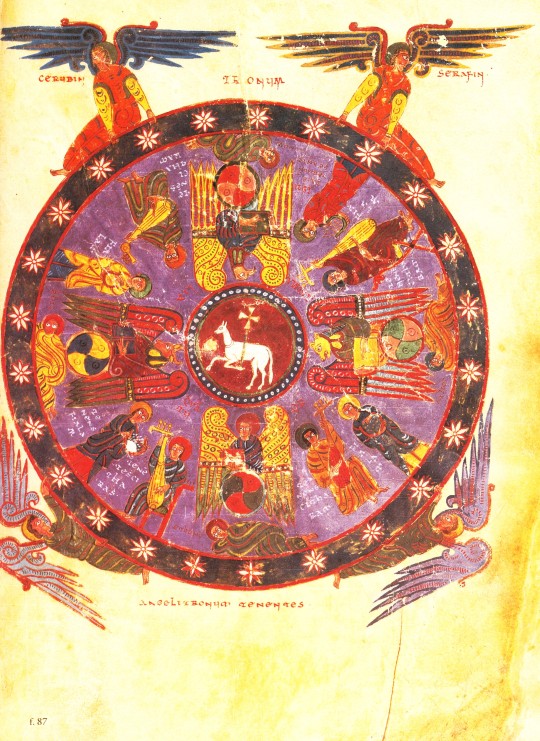

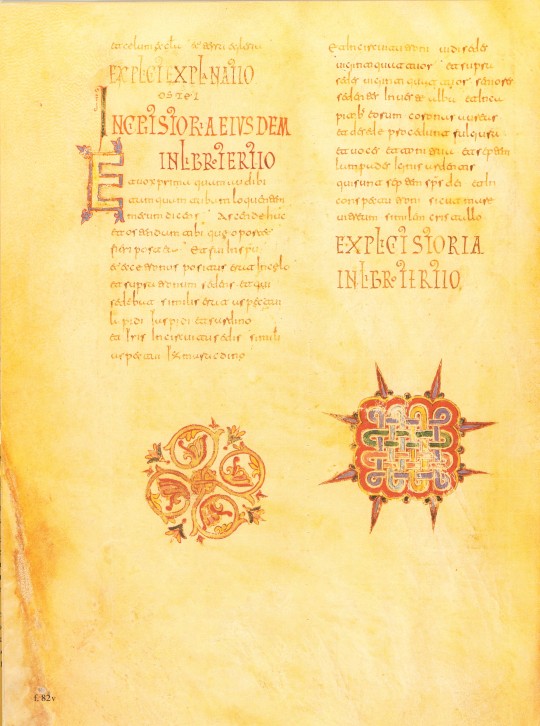
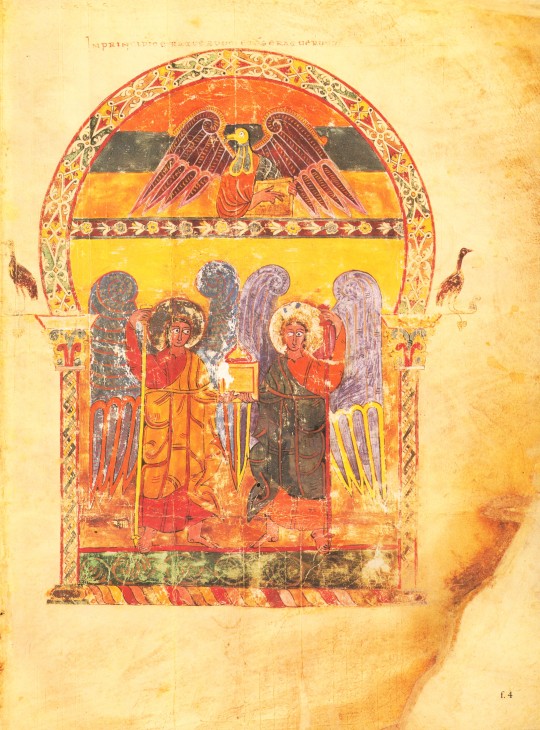

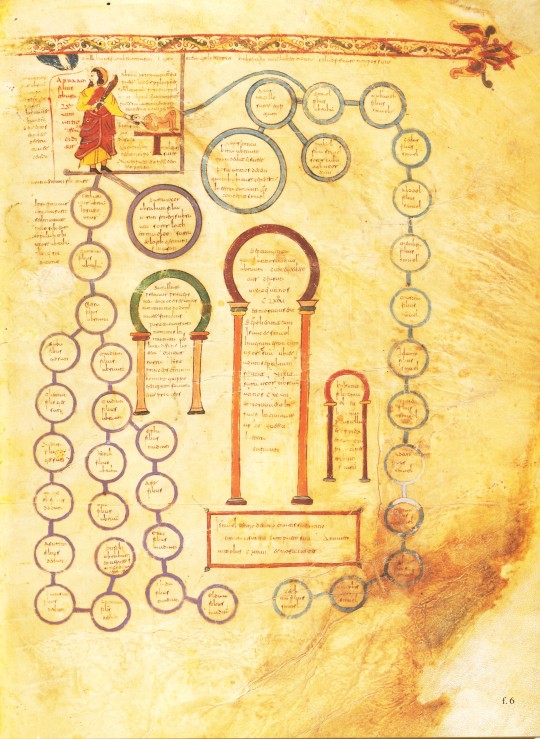


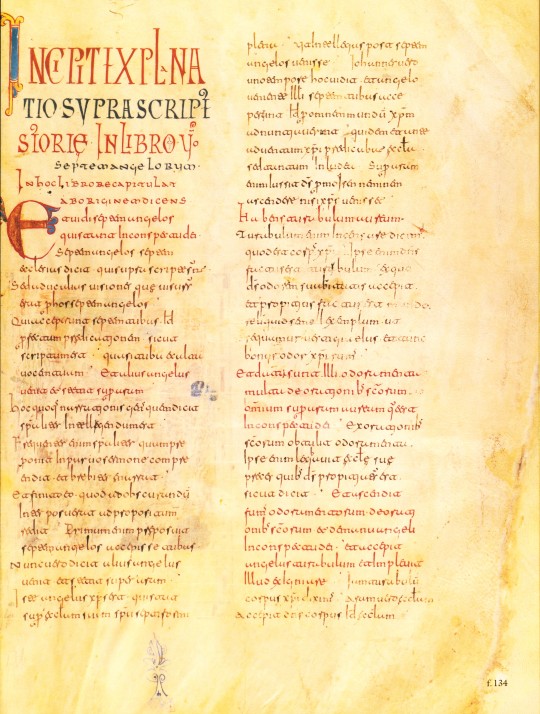
Welcome to Manuscript Monday!
In this series we will periodically focus on selections from our manuscript facsimile collection. Today we present selections from the Morgan Beatus Manuscript, reproduced as A Spanish Apocalypse, The Morgan Beatus Manuscript in New York by George Braziller, Inc. in association with the Pierpont Morgan Library in 1991. The original manuscript, made around 10th century CE at the scriptorium of San Miguel de Escalada in Spain by a monk named Maius, is the earliest surviving illuminated version of the monk Beatus of Liébana's commentary on the biblical Book of Apocalypse (also known as the Book of Revelation). The text of the Book of Revelation makes up the first part of the manuscript, and Beatus’s commentary comprises the second part. The Book of Revelation tells of the end-times in Christianity, during the final judgement of humanity by God. The story within this Biblical book was also seen by those living during the Latin medieval era as representative of the beginning of something new: God’s celestial kingdom. Due to this view of the book, many artists incorporated imagery from this part of the Bible in their work.
Produced in Al-Andalus, or Muslim-ruled Spain, the artistic style of this work combines both Muslim and Christian visual traditions to create a beautifully illuminated manuscript that supplements the commentary by the monk. This artistic style is known as the Mozarabic, which comes from the Arabic mustaʿrib, meaning ‘Arabicized’. Interestingly, this style of art can only be seen in Christian religious art and architecture from Spain at the time, as non-religious artistic objects made by Christians look so similar to Islamic versions of the same works that they cannot be identified as intentionally Christian. Some key Islamic artistic elements within the manuscript include buildings with horseshoe arches, intricate geometric and vegetal patterns as borders for larger images, and the large, bulging eyes of the illustrated animals.
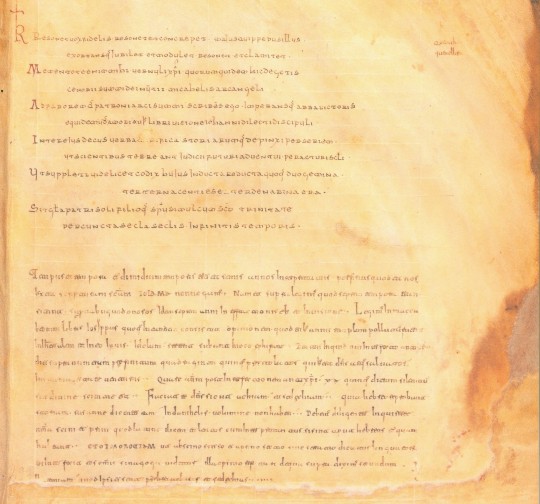
Another interesting aspect of this specific manuscript is the colophon at the end of the manuscript. It tells readers about the circumstances surrounding the creation of this book, including the maker, the patron, the year it was made, and an explanation about why Maius created the manuscript ("I write this . . . at the command of Abbot Victor, out of love for the book of the vision of John the beloved disciple. As part of its adornment I have painted a series of pictures . . . so that the wise may fear the coming of the future judgement of the world's end."). Colophons in medieval manuscripts are not usually as detailed, so the inclusion of all this information contributes greatly to the knowledge and history surrounding the Morgan Beatus Manuscript.
View more Manuscript Monday posts.
– Sarah S., Special Collections Graduate Intern
#manuscript monday#manuscripts#morgan library#morgan beatus manuscript#Beatus of Liébana#Spain#Christian art#Mozarabic#Islamic art style#facsimilies#Spanish art#Medieval art#Spanish medieval art#A Spanish Apocalypse#George Braziller#illuminated manuscripts#Sarah S.
141 notes
·
View notes
Text


some pics i found and LOVED on the Outsiders highlight on La Jolla Playhouse's instagram
📷 barton cowperthwaite & sky lakota-lynch
#THE FIRE ONE#ITS SO#ITS SOOOO BEATUFUL OUGHHHHH MY GOD#it hurts me truly#and johnny and pony......#literally them after faft right before everything goes to hell#their last truly happy moment together....#the outsiders musical#the outsiders broadway#the outsiders la jolla#barton cowperthwaite#sky lakota lynch#brody grant
17 notes
·
View notes
Text

Beatus a Liebana, Commentarius in Apocalypsim. Illumination: Adoration of the Beast. Navarre, c 1090 CE .
* * * * *
“If greed were not the master of modern man--ably assisted by envy--how could it be that the frenzy of economism does not abate as higher "standards of living" are attained, and that it is precisely the richest societies which pursue their economic advantage with the greatest ruthlessness? How could we explain the almost universal refusal on the part of the rulers of the rich societies--where organized along private enterprise or collective enterprise lines--to work towards the humanisation of work? It is only necessary to assert that something would reduce the "standard of living" and every debate is instantly closed. That soul-destroying, meaningless, mechanical, monotonous, moronic work is an insult to human nature which must necessarily and inevitably produce either escapism or aggression, and that no amount of of "bread and circuses" can compensate for the damage done--these are facts which are neither denied nor acknowledged but are met with an unbreakable conspiracy of silence--because to deny them would be too obviously absurd and to acknowledge them would condemn the central preoccupation of modern society as a crime against humanity.”
― E.F. Schumacher, Small Is Beautiful: Economics as if People Mattered
#Beatus a Liebana#Commentarius in Apocalypsim#illuminated art#Adoration of the beast#economics#late stage capitalism#quotes#E.F. Schumacher#Small is Beautiful: Economics as if People Mattered#“standards of living”
12 notes
·
View notes
Text

[ID: a collection of stick figures being violent and bloody. in the center of these images is text that reads "girls when they lament and weep, but no one has consoled them." End ID]
13 notes
·
View notes
Text

Beatus de Liebana, Daniel and the Angel, ca. 1100
19 notes
·
View notes
Text
Vues sur l'Apocalypse
2361. Beatus de Saint-Sever, (Charlotte Denoël) ((Charlotte Denoël), Beatus de Saint-Sever, ~1060) (Bibliothèque nationale, Citadelles et Mazenod,2022)
⌘ BnF ⌘ Beatus Wiki
7 notes
·
View notes
Text
for a girl who picks as many physically affectionate options as she does in visual novels (every option) U'd think maybe i'd be cooler with physical affection irl.
#nia chats#way too many tags. unplanned ramble on phone NO organizing or anything. ///#looking at my pinterest board 4 selfsjips w my head in my handss#like i truly beljeve i could be the clingiest cuddliest princess in the world yet in reality i think this would come as a shock#like itd my fault. LIKE ITS MY FAULY!!!#highschool flashbacks of hesitating and not huggibg people or getting near rhem Bc what if they actually dont want that (rivht now(. ohman#but then obviously They wouldnt initaiteBc Ud think I dont want it ever. Im cooked.. what if i wanthugsies WHAT ABIUT ME Oghhhcove...#Okg aki would have thus prpovkrm. and akaashi. Hahh.. Hahahah... ...... HAHAH!!!! ahaouzhkfh#ren couldfix this. He. all of themcouldnfix this. i miss donna. MY BEATUFUL GIRLFRIEND bdbejrjeufejrjrnrnfnrnr#imagine me lying flat onthe ground face in mud while it rains and iamngetting soaked and also suffociating inghemud. cant breathe#actually for most people im like. neutral. i think for me to feel akwward/uncomfortable i hav u labeled as not physical affectionperson#not as in like. u dont like it. necessarily. but that thats not part of our relationship. like mentally im like this is chill but my body#reacts like ????? ????? ?????? which youknowom. Glgot to work om that maybe...? Not necessairly#a girl cant keep saving pins if holding peoples arms and heads on ahoulders and holding hands and hufs and cuddling like this. GOD!!!!#o(-( orz <o> (head in hands) AAAAAAAUHHGGGG!!!!!!#whatever. keiji and aki hesitating in the same way as me until i initiate in a super casual sneaky heart palpitating exploding way#Ohhmygodd look at that. grabs ur arm. intertwines fingers. Imcolld. grabs ur arm. sleepy. head on shoulder. LIKE ID BE SO GOOD AT IT I JUST#NEED TO KNOW U WANT ME TO! and also personally want to. Which I MEAN COME ON ohmyhead. im gonna explode.#just theew up. jamie casual physical affection. JUSTHTRE WUP EVERYWHRE /pos /wish that was me#whateve.r Whatevwr. i dont even care. its me and my pillows and private pinterest board against the world. AUFH#ykw i think i could be good in a romanticnsituation. I THINK I COULD PULL IT OFF PEROSNALLY! alas. dying single etc etc
6 notes
·
View notes
Text

a bird killing a serpent as an allegory for christ destroying satan
in the "rylands beautus" (beatus of liébana's commentary on the apocalypse of st john), latin illuminated manuscript, spain, late 12th or early 13th c.
source: Manchester, John Rylands University Library, Latin MS 8, fol. 14r
#medieval art#12th century#13th century#rylands beautus#beatus of liébana#bird#serpent#satan#medieval illumination#illuminated manuscript#christian iconography
147 notes
·
View notes